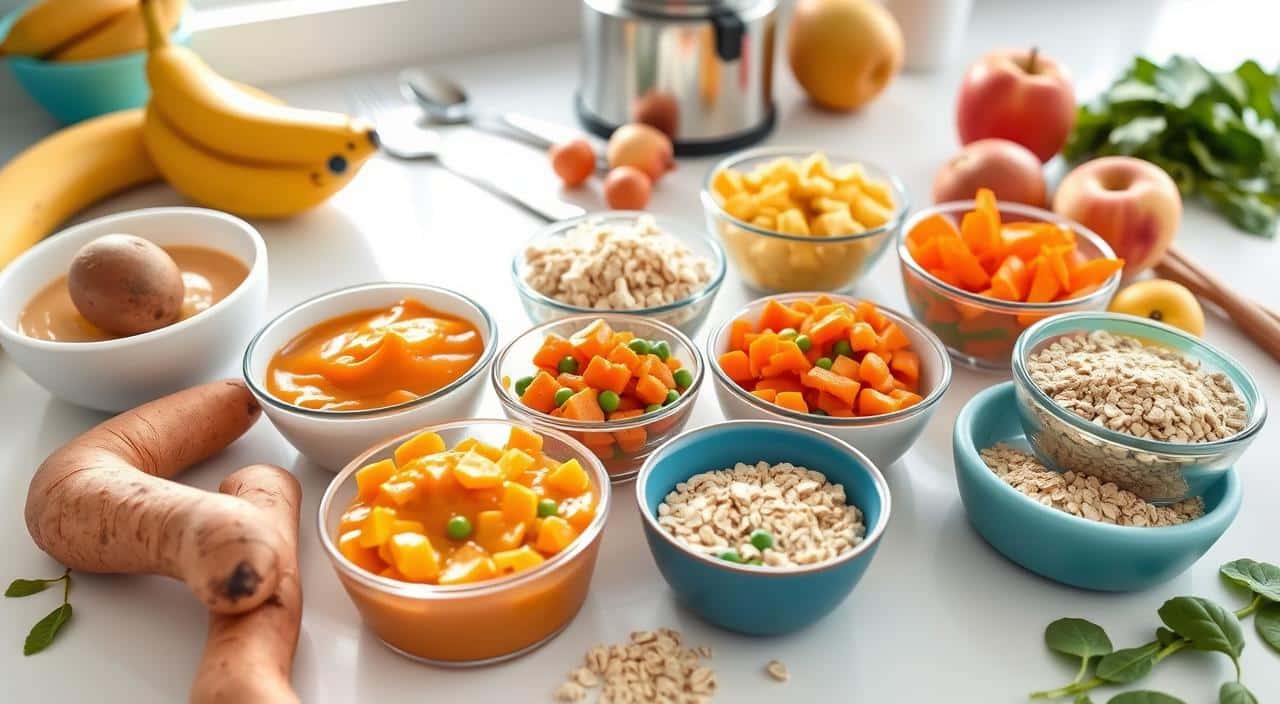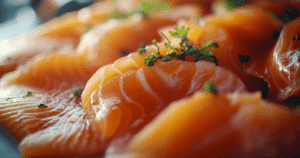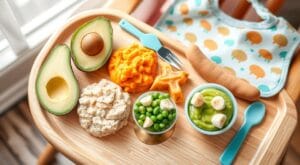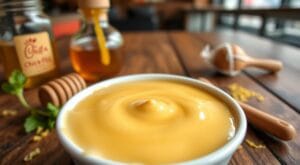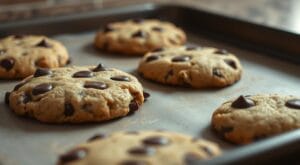Jump to:
Estimated reading time: 12 minutes
Table of contents
What homemade food can babies eat? When your baby is ready for solid foods, you might wonder what’s safe and healthy. Breastfeeding is best until 6 months, and solid foods should start after that. Always talk to your pediatrician about when and how to introduce solids safely.
What homemade food can babies eat? There are many healthy homemade foods you can give your baby. Think iron-fortified cereal, mashed avocado or banana, and pureed fruits and veggies. Making your own baby food lets your baby try different tastes. It also means you can control the sugar and salt they eat.
What homemade food can babies eat? Key Takeaways
- Homemade baby food is a nutritious and cost-effective way to introduce solids.
- Pureed fruits, veggies, and proteins like lentils or chicken are great first foods.
- Homemade food lets you avoid preservatives found in store-bought options.
- Introducing various flavors and textures can make your baby more adventurous with food.
- It’s crucial to store and prepare homemade baby food safely for their nutrition.
What homemade food can babies eat? Introduction
Feeding our little ones with homemade baby food is a rewarding journey for any parent. Homemade baby food lets you control what your baby eats. It’s a healthier choice than store-bought options.
Commercial baby foods are balanced, but homemade food offers more variety. You can add fresh fruits, veggies, proteins, and even herbs and spices. This can help your baby develop good taste and may lower the risk of food allergies.
“Homemade baby food is a great way to give your little one a healthy start. You can control the ingredients and introduce a variety of flavors.”
What homemade food can babies eat? in this article, we’ll look at the benefits of homemade baby food. We’ll share easy recipes and tips for safe food introduction. Homemade baby food is a great choice for any family, whether you’re new to parenting or not.
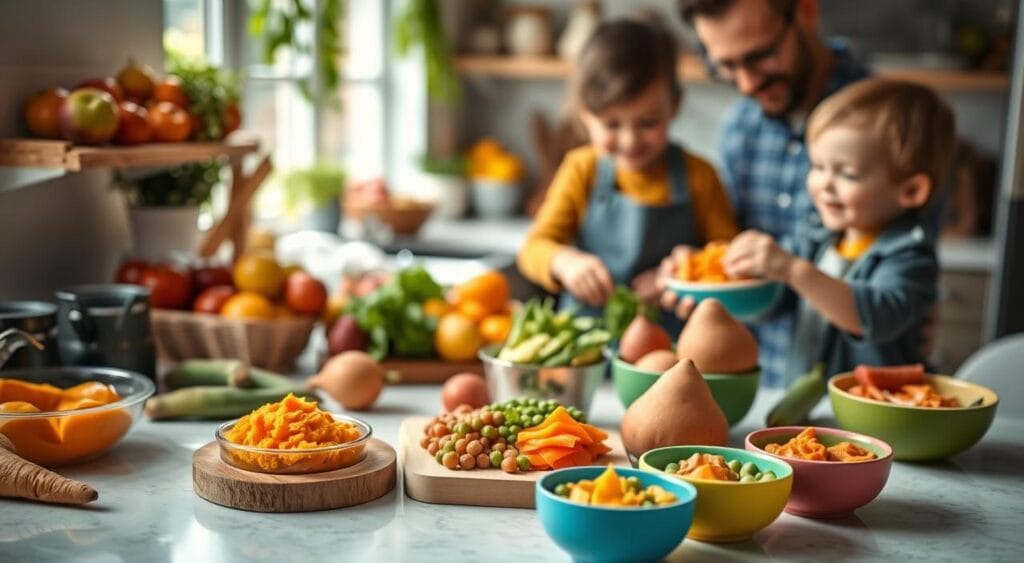
What homemade food can babies eat? Benefits of Homemade Food for Babies
Making your own fresh homemade baby food has many benefits. It lets you use natural ingredients. This means your baby avoids added sugars, salts, and preservatives.
Fresh and Natural Ingredients
When you make fresh homemade baby food, you pick the ingredients. This way, your baby gets food without harmful additives. It’s the purest and healthiest choice for them.
Control Over Nutritional Content
By making your own baby food, you control what goes into it. You can make sure your baby gets the right mix of nutrients. Studies show store-bought foods often have too much sodium and sugar.
Introducing a Variety of Flavors and Textures
Homemade baby food lets you introduce your baby to different tastes and textures. This helps them become more open to trying new foods. It’s good for their taste buds and helps them develop healthy eating habits.
In summary, making fresh homemade baby food is very beneficial. It ensures your baby eats natural ingredients, gets the right nutrients, and tries new flavors and textures. These benefits help your baby grow healthy and develop good eating habits for life.
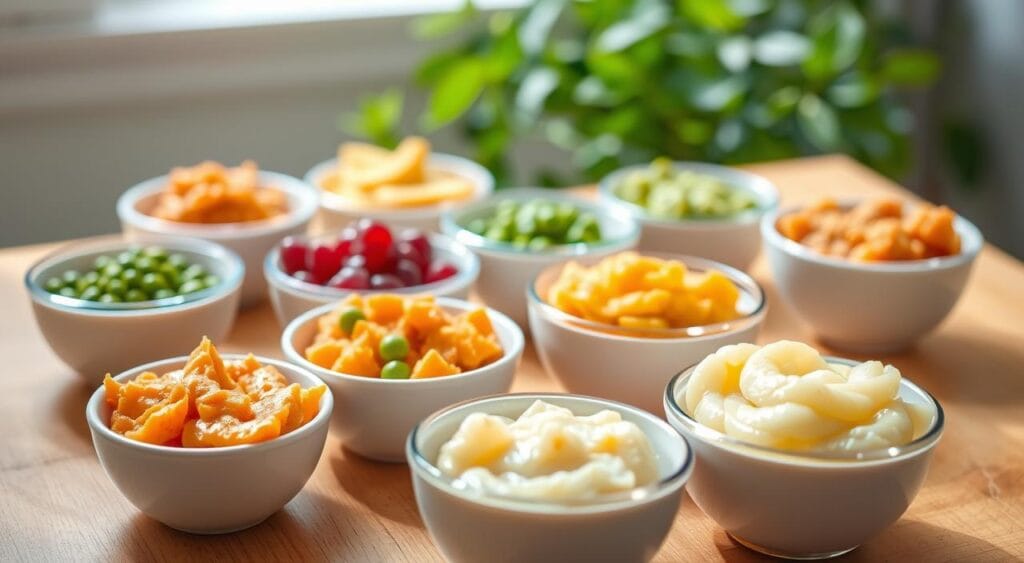
What homemade food can babies eat? First Foods: Purees and Soft Foods for Babies
When your baby is about six months old, it’s time to start with solid foods. You can give them simple vegetable and fruit purees. These are rich in nutrients that help your baby grow and develop.
Simple Vegetable Purees
Carrots, sweet potatoes, and peas are great for babies. They are full of vitamins, minerals, and fiber. These purees are good for your baby’s health.
Fruit Purees
Try apples, pears, and bananas for your baby. They are sweet and full of antioxidants and fiber. These are good for your baby’s health.
Protein-Rich Options
For enough protein, add lentils, chicken, and fish to their diet. These are key for growth and development.
Always introduce new foods one at a time. Wait a few days before trying another food. This helps you see if your baby has any allergies. Offering different foods ensures your baby gets all the nutrients they need.
What homemade food can babies eat? Soft Finger Foods for Self-Feeding Babies
As your baby grows, they can start eating soft finger foods. These foods are easy to pick up and feed themselves. You can try steamed veggies, ripe fruits, and soft pasta.
Steamed Vegetables: Broccoli Florets, Carrot Sticks, and Green Beans
Steamed veggies like broccoli, carrot sticks, and green beans are great for babies. They’re full of vitamins and minerals. Steam them until they’re soft for your baby to eat.
Soft Fruits: Avocado, Mango, and Blueberries
Avocado, mango, and blueberries are also good for babies. They’re full of nutrients and introduce new tastes. Make sure to cut them into small pieces to avoid choking.
Small Pieces of Soft-Cooked Pasta and Rice
When your baby can chew well, try soft pasta and rice. These foods give energy and help your baby grow. Start with small amounts for safety.
Always watch your baby while they eat. Start with small amounts for their safety. With the right foods, you can make mealtime fun and healthy for your baby.
“Many foods prepared for the family can work as baby finger foods if they are easy to squish between fingers and cut into small, easily chewable pieces.”
What homemade food can babies eat? Healthy Meal Ideas for Older Babies
As your baby grows, you can start adding more complex meals to their diet. These recipes and ideas are full of important nutrients. They help support your baby’s growth and development.
Mashed Sweet Potato with Ground Turkey
Mash roasted sweet potato and mix it with cooked ground turkey. This meal is both satisfying and nutritious. Sweet potato gives complex carbs, beta-carotene, and fiber. Turkey adds high-quality protein and iron.
This dish is packed with vitamins, minerals, and healthy fats. It’s a great choice for your baby’s meals.
Scrambled Eggs with Spinach and Cheese
Scramble eggs with chopped spinach and a sprinkle of shredded cheese. This meal is full of protein and easy for older babies to eat on their own. Eggs are a good source of choline and iron.
Spinach boosts vitamins and minerals. Cheese adds more protein and fat. This helps support your baby’s growth.
Mini Pancakes with Banana and Oats
Make mini pancakes with mashed banana, rolled oats, and a bit of coconut oil or butter. These pancakes are packed with nutrients. They have complex carbs, fiber, and healthy fats.
They give your baby the energy they need. Top them with cinnamon for extra flavor.
These meal ideas offer a variety of healthy homemade baby food recipes. They include veggie and protein-rich dishes, as well as fruit-based finger foods. By offering a range of nutritious finger foods for babies, you ensure your child gets the nutrients they need.
What homemade food can babies eat? Introducing New Foods Safely and Managing Allergies
Starting your baby on new foods is an exciting journey. It’s important to do it safely and watch for signs of allergies. Make sure your baby is ready for these new tastes and introduce potential allergens carefully.
Signs Your Baby Is Ready for New Foods
Babies are usually ready for solid foods when they double their birth weight. This usually happens around 4 months, when they weigh about 13 pounds or more. The American Academy of Pediatrics suggests exclusive breastfeeding for 6 months. Then, start introducing foods at about 6 months.
How to Introduce Potential Allergens
The American Academy of Pediatrics says to introduce potential allergens early, between 4-6 months. Start with small amounts of one ingredient at a time. Watch for signs like rash, vomiting, or trouble breathing. If you see any of these, stop that food and talk to your pediatrician.
Monitoring for Allergic Reactions
The top nine allergens include milk, egg, peanuts, and more. It’s key to introduce these foods one at a time. Watch how your baby reacts. Early introduction can lower the risk of food allergies by up to 80%.
What homemade food can babies eat? Nutritional Guidelines for Homemade Baby Food
When introducing solid foods to your baby, nutrition is key. Preparing homemade baby food means balancing macronutrients and vitamins. It’s also important to keep your baby hydrated.
Balancing Macronutrients: Carbohydrates, Protein, and Fat
Babies need carbs, protein, and fats for growth. Use whole grains, lean proteins, and healthy oils like avocado or olive oil. These provide energy and support your baby’s body.
Essential Vitamins and Minerals: Iron, Calcium, and Vitamin D
Iron, calcium, and vitamin D are vital for your baby’s health. Include iron-rich foods like meat, fortified cereals, and leafy greens. Also, add calcium-rich foods like yogurt, cheese, and green veggies.
Hydration and Fluid Intake Recommendations
As your baby starts eating solids, they need enough water. Breastmilk or formula should still be the main source of fluids. Gradually add small amounts of water as they get used to solids.
| Nutrient | Importance for Babies | Good Sources in Homemade Baby Food |
|---|---|---|
| Carbohydrates | Provide energy for growth and development | Whole grains, starchy vegetables, fruits |
| Protein | Support muscle, bone, and tissue growth | Meat, poultry, fish, eggs, legumes |
| Healthy Fats | Promote brain and eye health | Avocado, olive oil, nut butters |
| Iron | Crucial for red blood cell formation and oxygen transport | Pureed meat, fortified cereals, leafy greens |
| Calcium | Supports strong bones and teeth | Yogurt, cheese, green vegetables |
| Vitamin D | Aids in calcium absorption and immune function | Fortified milk, fatty fish, egg yolks |
By following these guidelines and using a variety of foods, your homemade baby food will be full of essential building blocks for growth.
Preparing and Storing Homemade Baby Food Safely
Preparing homemade baby food needs extra care. Start by using clean, well-scrubbed produce, utensils, and work surfaces. Cook foods until very tender, then puree or mash to the right texture for your baby.
Best Practices for Food Preparation
Follow these best practices for safe and effective preparation:
- Thoroughly wash all fruits and vegetables before cooking.
- Use a clean blender, food processor, or immersion blender to puree the cooked ingredients to the desired consistency.
- Avoid cross-contamination by cleaning all surfaces and utensils between preparing different foods.
- Cook meats, poultry, and fish to the recommended safe internal temperatures.
Safe Storage and Freezing Tips
For storing homemade baby food safely, freeze single-serving portions in airtight containers. Label with the date. Homemade frozen baby food can be stored for 1-2 months. Store-bought fruits and vegetables can be frozen for 6-8 months.
| Food Type | Freezer Storage Time |
|---|---|
| Homemade Baby Food | 1-2 months |
| Store-bought Fruits and Veggies | 6-8 months |
Reheating and Serving Guidelines
When reheating baby food, mix thoroughly and check the temperature. This avoids burning your baby’s mouth. Thawing frozen baby food using the refrigerator method takes 4-12 hours. Plan ahead.
Homemade frozen baby food that has been thawed can be safely stored in the refrigerator for up to 48 hours.
Following food safety guidelines is crucial to ensure your homemade baby food is nutritious and risk-free.
What homemade food can babies eat? – Frequently Asked Questions
What are some healthy homemade foods for babies?
Healthy homemade foods for babies include purees of vegetables like sweet potatoes, carrots, or peas, as well as fruits like apples, pears, and bananas. These purees provide essential vitamins and are easy to make at home.
Can I make homemade baby cereal?
Yes, you can make homemade baby cereal by grinding oats or rice into a fine powder, cooking it in water, and mixing it to a smooth consistency. This is a nutritious and customizable option for baby’s first cereals.
What protein-rich foods can I prepare for my baby?
You can prepare protein-rich foods like pureed chicken, turkey, or lentils. For plant-based options, try blending soft tofu or cooked beans. These foods support growth and muscle development in babies.
How do I prepare homemade meals for baby-led weaning?
For baby-led weaning, steam or roast soft foods like sweet potato sticks, avocado slices, and scrambled eggs in baby-sized pieces. These are easy for babies to hold and encourage self-feeding skills.
Are homemade baby foods more nutritious?
Homemade baby foods can be more nutritious because you control the ingredients, avoiding added sugars, salt, and preservatives. Fresh ingredients preserve nutrients, supporting your baby’s growth and development.
Conclusion
Preparing homemade baby food has many benefits of homemade baby food for your little one. It lets you control what they eat, introduces them to new tastes and textures, and ensures they get the nutrients they need. Making your own baby food might seem hard at first, but it’s actually convenient of homemade baby food and fulfilling.
By following key tips for making homemade baby food, you can give your baby a healthy diet. This is important for their early growth and development. It’s a way to nourish your child with care and attention.
Homemade baby food lets you control the quality and nutrients in your child’s meals. This is crucial for their growth. It also helps them try different flavors and textures. This can help them avoid being picky eaters later on.
While making homemade baby food takes some time at first, the benefits are worth it. You can safely store and freeze the food you make. This makes it easy to have healthy meals ready for your baby. With a bit of planning, you can give your child the best nutrition for their growth.
